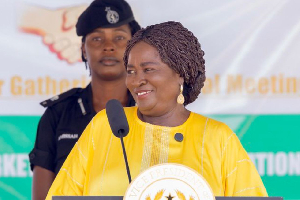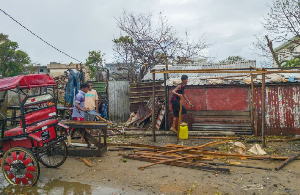Fitch Ratings has revised the Outlook on Ghana's Long-term foreign and local currency Issuer Default Ratings (IDR) from stable to negative, casting doubts over the country’s ability to service its debts in the future in time.
It has, however, affirmed the ratings at 'B'.
The agency has also affirmed the Short-term foreign currency IDR at 'B' and Country Ceiling at 'B'. The issue ratings on Ghana's senior unsecured foreign and local currency bonds are also affirmed at 'B'.
Key rating drivers
The Outlook revision reflects the following key rating drivers and their relative weights:
High: Ghana's fiscal position has worsened further over the past six months. Revenue underperformance and intractable expenditure on wages and interest led to a budget deficit of 10.8% of GDP in 2013, wider than the government's target of 9%.
This, combined with a sharp 20% depreciation of the exchange rate, caused government debt to rise to 61.8% of GDP in 2013 from 48.9% in 2012.
Fitch's public debt figure differs from the authorities' figure of 52.8% of GDP, due to Fitch's use of exchange rate data provided by Bloomberg to convert end-year external debt into domestic currency, in contrast to the authorities' use of the Bank of Ghana transaction rate.
Policy credibility has been significantly weakened, following two years of double-digit and larger-than-expected budget deficits.
Ghana's 2014 budget again aims for limited fiscal consolidation. The budget targets a deficit of 8.5% of GDP and defers by a year (until 2016) its target deficit of 6% of GDP. Fitch maintains the view that the pace of fiscal consolidation will be slower than the government projects.
This reflects a divergence in views on the government's capacity to significantly expand the revenue base. Containing current expenditure as well as curtailing arrears will also remain a challenge. Fitch forecasts a deficit of 9.3% of GDP for 2014, narrowing to 8.2% in 2015.
Ghana's current account deficit widened to 13.7% of GDP in 2013, with the balance of payments recording a deficit of USD1.1bn. Despite this deficit, gross reserves were unchanged due to increased use of swaps. Reserves net of foreign liabilities such as swap facilities, stood at a modest USD2.7bn (or 1.3 months of current external payments) in December 2013, against gross reserves of USD5.6bn (or 2.7 months of current external payments). The Bank of Ghana does not provide any detail of the maturity structure of its external liabilities.
Medium: Financing the deficit is becoming increasingly challenging and costly, with yields on T-bills and one-year bonds jumping to 23% at the latest auction, while the government opted not to issue five-year debt due to punitive rates on offer. Fifty per cent of Ghana's government debt is domestic, with 60% characterised as short-term. Foreign holdings of government bonds have remained broadly unchanged at 23% of domestic debt since July 2013, although demand for new paper has become more muted. Foreign investors are confined to maturities of three years and above. The authorities have also announced that they will not issue a eurobond this year, unless borrowing costs become more favourable.
Ghana's large budget deficit is adversely impacting economic stability, with the current account deficit and inflation firmly in double digits. The current account deficit and strong domestic demand for dollars have exerted sharp pressure on the exchange rate, which fell 20% in 2013 and a further 10.6% this year, contributing towards inflation accelerating to 13.8% in January 2014 from 6.1% in June 2013. Fitch expects inflation to average 15% in 2014.
Ghana's weaker growth outlook over the next two years will complicate fiscal consolidation. Fitch forecasts growth to average 5.7% between 2013 and 2015, compared with 8.1% over the previous five years. High domestic interest rates, economic vulnerabilities, as well as challenges in the core power sector will weigh on growth.
Ghana's 'B' IDRs also reflect the following key rating drivers: The ratings are supported by Ghana's strong governance record and democratic history, highlighted by the peaceful transfer of power in 2012 and respect for judicial due process.
Ghana's business environment compares favourably even with 'BB' median countries. This is reflected in Ghana's ability to attract foreign direct investment, which at 7% of GDP is well above Nigeria, Gabon, Zambia, Kenya and Angola.
Rating sensitivities
The main factors that individually, or collectively, could trigger negative rating action include:
A further deterioration in external finances and an erosion of Ghana's international reserve position which jeopardises the country's external financing capacity
-Increased domestic financing constraints, further deterioration in fiscal accounts and government debt dynamics
- Worsening economic performance and stability
The current rating Outlook is Negative. Consequently, Fitch's sensitivity analysis does not currently anticipate developments with a material likelihood, individually or collectively, of leading to an upgrade. However, future developments that may, individually or collectively, lead to a revision of the Outlook to Stable include:
-An effective fiscal consolidation that places debt-to-GDP firmly on a downward trajectory An improvement in Ghana's external position reflected in a narrowing of the country's current account deficit and an improvement in international reserves.
Key assumptions
Fitch assumes Ghana's GDP growth will remain above 5% in 2014-2015 and in the medium term. This in turn will depend on oil production coming on stream as expected; the continued development of the gold sector; and further investment in infrastructure.
Fitch assumes that some fiscal consolidation will take place, albeit at a slower pace than the authorities' projections.
Fitch assumes no sustained deep fall in commodity prices that would undermine an already weak external position
Business News of Friday, 28 March 2014
Source: Reuters













